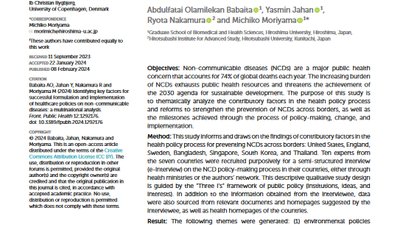El Plan de Plan de Atención Integral a la Fragilidad y Promoción de la Longevidad Saludable en personas mayores representa la apuesta de la Comunidad de Madrid por un enfoque de gestión común de las personas mayores que son frágiles o en riesgo de desarrollar fragilidad, y para ello inicia el diseño y posterior implementación del Plan de Atención Integral a la Fragilidad y Promoción de la Longevidad Saludable 2022-2025, que desarrolle, entre otros aspectos ...
En las últimas décadas, el progresivo envejecimiento de la población en los países desarrollados ha provocado un aumento significativo del número de personas con al menos una enfermedad crónica. Como consecuencia, es fundamental que la formación pregrado en Medicina aporte conocimientos sobre la cronicidad, de forma que los médicos puedan proporcionar un manejo adecuado a estos pacientes. A pesar de ello, la presencia de la cronicidad en los currículos formativos de las facultades de Medicina ...
La transformación de los sistemas de salud en Europa y el diseño, desarrollo e implementación de tecnologías que aseguren la sostenibilidad de los sistemas es una necesidad, que la Unión Europea ha comenzado a abordar, para dar respuesta al progresivo envejecimiento de la población, a la creciente carga de afecciones crónicas y multimorbilidad y al aumento en las necesidades de atención. La innovación digital tiene el potencial de mejorar la coordinación y los canales de ...
La integración de servicios sociales y de empleo se ha consolidado como una de las reformas de innovación social prioritarias en las políticas europeas. Su finalidad es superar los obstáculos que representan la fragmentación institucional de los sistemas de bienestar y así ofrecer mejores respuestas a la creciente complejidad de las problemáticas sociales. Este artículo tiene por objetivo contribuir al conocimiento sobre la integración de servicios sociales y de empleo en España a partir del ...
El objetivo de este artículo es evaluar la magnitud y la trascendencia de un proceso de estratificación y planificación anticipada de los cuidados y el uso de recursos hospitalarios en pacientes con COVID-19 en un programa de atención integrada para pacientes adultos mayores frágiles en residencias.
A pesar del importante papel que desempeñan las enfermeras en la coordinación de los cuidados, existen pocos programas educativos para apoyarlas mejor en esta función. La identificación de un conjunto de actividades básicas de coordinación de cuidados en programas heterogéneos de coordinación de cuidados facilitaría el desarrollo de un estándar de práctica.
En marzo de 2022, la Fundación Internacional para la Atención Integrada (IFIC) lanzó su primera encuesta en toda su red en la que pedía a la gente que compartiera sus opiniones sobre lo que significa para ellos la atención integrada y las características de la atención integrada que consideraban más importantes en su experiencia y contexto.
Este artículo analiza una importante reforma de la asistencia sanitaria y social que establece nuevos condados regionales y servicios integrados de bienestar en Finlandia.
Las personas que viven con multimorbilidad a menudo dependen del apoyo de cuidadores familiares informales, sin embargo, con frecuencia surgen desafíos cuando los cuidadores de personas con multimorbilidad interactúan con los profesionales de la salud y los sistemas de atención médica.
El envejecimiento creciente de la población y el incremento del número de pacientes crónicos y pluripatológicos que aspiran a disfrutar de una buena calidad de vida, hacen fundamental una revisión y adaptación del actual modelo de prestación sanitaria con el fin de dar respuesta a las necesidades de este tipo de pacientes con necesidades complejas.
Información de apoyo a gestores, investigadores, profesionales de la salud y a pacientes y cuidadoras, que trabajan en la en la gestión de Enfermedades Crónicas Complejas, e incluye publicaciones como artículos, informes, modelos de gestión, estudios y legislación relacionados con la materia. En esta sección se incluyen algunas publicaciones que pueden no ser de libre acceso (propiedad intelectual), y cuya inclusión en OPIMEC está basada en el derecho de cita y con referencia a la fuente original.
Esta sección se contempla como un repositorio de conocimiento abierto y en la que todos los miembros de OPIMEC pueden añadir nuevas publicaciones. Por favor para cualquier duda o sugerencia pónganse en contacto con el equipo editorial. Asimismo podrá acceder a la suscripción RSS de publicaciones si es de su interés.
Para que su publicación aparezca en OPIMEC sólo tiene que registrarse y formará parte de este esfuerzo conjunto con los/as mejores profesionales internacionales en la materia.




